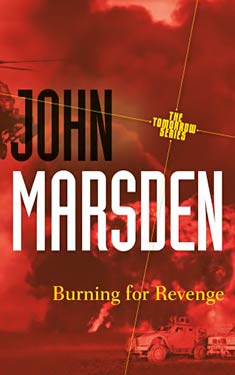Burning for Revenge
| Author: | John Marsden |
| Publisher: |
Houghton Mifflin, 2000 Pan Macmillan, 1997 |
| Series: | Tomorrow: Book 5 |
|
1. Tomorrow, When the War Began |
|
| Book Type: | Novel |
| Genre: | Science-Fiction |
| Sub-Genre Tags: | Near-Future |
| Awards: | |
| Lists: | |
| Links: |
|
| Avg Member Rating: |
|
|
|
|
Synopsis

PEN America's Index of School Book Bans – 2023-2024 lists instances where students' access to books in school libraries and classrooms in the US was restricted or diminished, for either limited or indefinite periods of time. Some of these bans have since been rescinded and some remain in place.
If only our country hadn't been invaded. If only we could have carried on the way we used to, watching other people wars on television.
Book 5 of The Tomorrow Series. Ellie and her friends are more determined than ever to make an impact on the enemy. But the constant fighting is beginning to take its toll on the group. Kevin is suffering an emotional breakdown, and the friendship that has kept the gang together for so long is under strain. And while there is no time for love in a time of war, Ellie can't forget her feelings for Lee...
A tale of relentless action and gripping intensity from one of the world's best storytellers.
Excerpt
The summer storms are the wildest. Maybe that's because they're so unexpected. But they can really rip a place apart. It's like the sky saves it all up, then lets it go in one huge blast. The air shakes. There's nothing soft or gentle about the rain: it pours down, a huge heavy torrent that wets you to the skin in half a minute. The thunder's so close and loud you feel it all around you, like a landslide or an avalanche. And sometimes there's hail.
Before the war, I found summer storms exciting. I enjoyed the noise and the violence and the out-of-control wildness, even though I knew there'd be problems afterwards. Trees blown down or struck by lightning, fresh-shorn sheep getting dangerously cold, creeks flooding.
Occasionally the problems came during the storms. One time I had to go out in massive rain to move a small mob of ewes, because a falling tree brought down their fence and the rams were getting horny. I started moving the mob but Millie, the dog, got a bit excited and when one sheep went the wrong way she chased it straight into the creek. The creek was running at a million k's an hour, about to break its banks. The water was just beginning to lap over on both sides. The ewe and the dog, both paddling like mad, got swept away. I ran along the bank, trying to find a spot where I could jump in and pull them out. To be honest, I didn't think they had much hope. But a kilometre down the paddock they were washed up on a gravel spit. The ewe staggered out, half-drowned. Millie staggered out, half-drowned too. She didn't hesitate. She went straight after that sheep again, chasing it back to the mob.
Poor sheep. There are times when I feel quite sorry for sheep.
Another time we were out at the Mackenzies' when a big storm hit. We got home to find a sheet of galvanised iron had come loose on the shearing shed. It was flapping in the wind with a sound I've never forgotten. Like it wanted to beat itself to death -- a frantic, desperate, wild noise. When I got up on the ladder, I could see the iron tearing centimetre by centimetre: solid indestructible metal being ripped apart by the wind. It was quite scary trying to hammer down this crazed, thrashing thing in the dark.
Here, in this place I've learned to call home, a summer storm is dramatic. In the Bible it says Hell is a place of heat and fire. This is officially called Hell -- that's the name on the maps -- and it does get hot in summer. But when a storm drops on top of us, it's hypothermia country and the temperature can fall fifteen degrees in half an hour.
Of course if life had gone the way it was meant I wouldn't be sitting in a little tent in Hell, watching the fabric stretch and pull, watching the rain chuck a tantrum against the fly, listening to the screech of another branch ripping and falling, and trying to keep writing this record of our lives.
I would have been sitting in our snug cabin in New Zealand, eating pizza and reading Pride and Prejudice or The Horse's Mouth for the fourth time. Better still, I would have been back at my real home, checking the water troughs in the paddocks or yabbying in a dam or cutting the poor breeders out of a mob of cattle, to send to market.
Well none of those things would happen for a while yet. They might never happen again. I just had to accept that, but it didn't stop me playing the old useless game of 'if only'.
If only our country hadn't been invaded.
If only we could have carried on the way we used to, watching other people's wars on television.
If only we'd been better prepared, and thought more about this stuff.
Then later, when we'd got ourselves out of the battle zone, if only we hadn't agreed to come back and continue the fight, to help the Kiwi soldiers in their failed attempt at the airbase.
Well, we didn't really have much choice about coming back -- Colonel Finley put so much pressure on us.
And we put pressure on ourselves.
That was another 'if only'. I suppose we would have felt guilty if we hadn't come back. Besides, we had such high hopes of meeting up with our parents again. If only we could have all been as lucky as Fi. She at least got to see her parents for half an hour.
I was still burning about Colonel Finley. The helicopter he was meant to send. The helicopter he'd promised us. The way he more or less abandoned us after his Kiwi troops went missing. The way that when we called up and asked for the chopper, suddenly they were too busy. For a dozen crack New Zealand troops we knew there'd have been no problem. But for us, there was a major problem.
The joke was that we'd achieved more with our rough-and-ready tactics, our homemade bombs and make-it-up-as-you-go approach than just about any professional soldiers could have done. We thought so anyway, and when we were in New Zealand enough people were ready to tell us that. Only now that we were back here, trapped in lonely wild Hell, they seemed happy to forget us.
If only the chopper had turned up and whisked us back to safety. I wanted it to be like a taxi: just dial the number. Where are you going? How many passengers? What name? We'll have it there in no time, love, no worries.
It was hard not to be bitter. We felt like Colonel Finley had dumped us. We talked about it non-stop for a week, till we got sick of it as a topic for conversation, and agreed not to talk about it any more. That was the only way we could stop it poisoning us.
After we'd finished our week or so of sulking we started getting restless. Lee was the worst. Since he found out about the death of his parents he was burning for action. When I say action I don't necessarily mean revenge, although he sure was keen on that. But I think he could have been distracted from thoughts of revenge if there'd been other things to think about, other things to do.
There was nothing. We'd built a few odds and ends in Hell - the chook shed mainly - but we couldn't build anything else because it was too dangerous. There was such a risk of being seen from the air or even from the top of Tailor's Stitch, the ridge that wound far above us, the west wall of our hideout. Lee didn't seem interested in reading the few books we'd brought, he didn't have his precious music with him and he wasn't in the mood for talking. All he had were his thoughts. He sat alone for hours every day and wouldn't even tell me what he was thinking.
Homer and Kevin weren't any better. One afternoon they spent four hours trying to hit a tree trunk with pebbles. They sat on the bank of the creek and chucked stones at the tree until they ran out of ammo, then they went over and picked up the pebbles and started again. By the end of the afternoon Homer had hit it six times and Kevin three. Fair enough, it was fifty metres away, but I thought they could have done better. I thought I could have done better. That wasn't what bothered me though. It was their mood. They seemed so flat, so uninterested. I nearly suggested going out and attacking the enemy again, just to get them motivated.
As it happened I didn't need to suggest that. Almost at the same moment as I thought it -- well, less than half an hour later -- Lee suddenly turned to me and said: 'I'm leaving here, going to Wirrawee or somewhere. Cobbler's Bay maybe. Stratton even. I'm not going to spend the rest of the war sitting around waiting to be rescued. I want to do as much damage as I can.'
Copyright © 1997 by John Marsden
Reviews
There are currently no reviews for this novel. Be the first to submit one! You must be logged in to submit a review in the BookTrackr section above.
Images
No alternate cover images currently exist for this novel.



















 Full Details
Full Details






